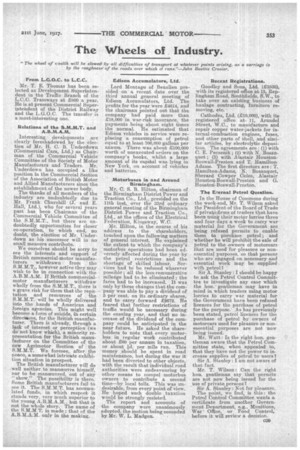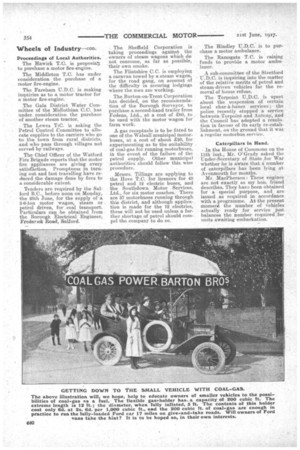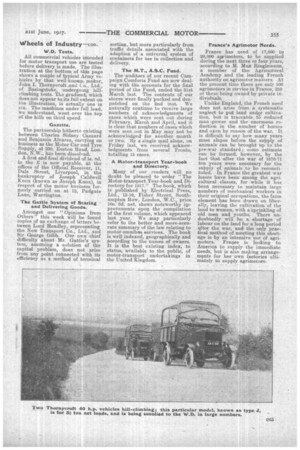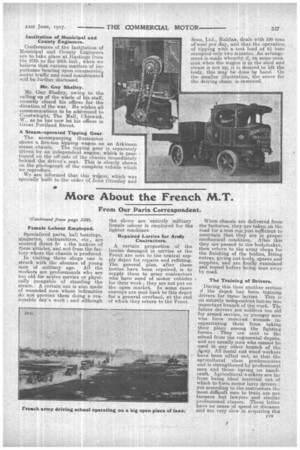The Wheels of _ Industry.
Page 9

Page 10

Page 11

Page 13

If you've noticed an error in this article please click here to report it so we can fix it.
" The wheel of vealth will be slowed by all difficulties of transport at whatever points arising, as a carriage is
by the roughness' of the roads over which it runs."—John Beattie Crozier.
From L.G.O.C. to L.C.C.
Mr. T. E. Thomas has been selected as Development Superintendent in the Traffic Branch of the L.C.C. Tramways at 2800 a year. He is at present Commercia] Superintendent of the District Railway and the L.G.O.C. The transfer is a most-interesting one.
Relations of the S.M.M.T. and A.B.M.A.M.
Interesting developments are clearly foreshadowed by the election of Mr. H. C. B. Underdown (Commercial Cars, Ltd.) as Chairman of the Commercial Vehicle Committee of the Society of Motor Manufacturers and Traders. Mr. Underdown has occupied a like position in the Commercial Section of the Association of British Motor and Allied Manufacturers since the establishment of the newer body. The thanks of all members of the industry are undoubtedly due to Mr. Frank Churchill (J. and E. Hall, Ltd.), who for several years past has been Chairman of the Commercial Vehicle Committee of the S.M.M.T., but there are undoubtedly opportunities for closer co-operation, to which end, no doubt, the election of Mr. Underdown as his successor will in no small measure contribute.
We ourselves should be sorry to see the interests and support of British commercial-motor manufacturers withdrawn from the S.M.M.T. however active they may wish to be in connection with the A.B.M.A.M. If British commercialmotor manufacturers withdraw wholly from the S.M.M.T., there is a grave risk for them that the reputation and resources of the S.M.M.T. will be wholly delivered into the hands of American and foreign agencies. This might well become a form of suicide, in certain directions, for the British manufacturer. There is already, through a taek of interest or perception (we do not know which), a minority representation for the British manufaeturer on the Committee of the new Agrimotor Section of the S.M.M.T. We foresee, after fhe peace, a. somewhat intricate exhibition situation in prospect. The British manufacturer will do well neither to manoeuvre himself, nor to be manceuvred, out of any "show." The possibility is there. Some British manufacturers fail to see it. The S.M.M.T. has accumulated funds, in which respect it stands very, very much superior to the young A.B.M.A.M.. but that is not the whole story. The name of the S.M.M.T. is made ; that of the A.B.M.A.M. only in the making. Edison Accumulators, Ltd.
Lord Montagu of Beaulieu presided on a recent date over the third annual general meeting of Edison Accumulators, Ltd. The profits for the year Were 24614, and the chairman pointed out that the company had paid more than 218,000 in war-risk insurance, the payments being about eight times the normal. He estimated that Edison vehicles in service were replacing a consumption of petrol equal to at least 700,000 gallons per annum. There was about 2100,000 worth of unexeeuted orders on the company's books, whilst a large amount of its capital was lying in New York, on account of vehicles and batteries.
Motorbuses in and Around Birmingham.
Mr. C. S. B. Hilton, chairman of the Birmingham District Power arid. Traction Co., Ltd., presided on the 11th inst. over the 33rd ordinary general Meeting of the Birmingham District Power and Traction Co., Ltd., at the offices of the Electrical Federation, Kingsway, W.C. Mr. Hilton, in the course of his address to the shareholders, touched upon the following matters of general interest. He explained the extent to which the company's motorbus operations had been adversely affected during the year by the petrol restrictions and the shortage of skilled labour. Services had to be reduced wherever possible ; all the less-remunerative mileage had to be eliminated ; the fares had to be increased. It was only by these changes that the company was able to pay a dividend of 5 per cent, on its .ordinary shares, and to carry forward 22672. He feared that further restrictions of traffic would be necessary during the ensuing year, and that no increase of the dividend of the company could be anticipated in the near future. He asked the shareholders to note that every motorbus in regular work contributed about £60 per annum in taxation, or about per mile run. This money should be spent in road maintenance, but during the war it had been diverted to other objects, with the result that individual road authorities were endeavouring by other means to compel motorbus owners to contribute a second time—by local tolls. This was undesirable, from every point of view. He hoped such double taxation would be strongly resisted. The report and accounts of the company were unanimously adopted, the motion being seconded by Mr. W. L. Madgen. Recent Registrations.
Goodley and Sons, Ltd. (23500), with its registered office at 15, _Replingham Road, Southfields, S.W., to take over an existing business of haulage contracting, furniture removing, etc.
Cathodes, Ltd. (Z10,000), with its registered office at 11, Arundel Street, W.C., to manufacture and repair copper water-jackets for internal-combustion engines, fuses, and other parts of shell, and similar articles, by electrolytic deposition. The agreements are : (1) with C. E. Peczenik ; (2) with N. Bosanquet ; (3) with Alastair HoustonBoswall-Preston and T. Hamilton. Adams. The first directors are : T. Hamilton-Adams, N. Bosanquet, Sherard Cowper Coles, Alasta,ir Houston-Boswall-Preston and G. Houstoti-Boswall-Preston.
The Eternal Petrol Question.
In the House of Commons during the week-end, Mr. T. Wilson asked the President of the Board of Trade if privato!firms of traders that have beer& using their motor lorries three and four days a -week to carry war material for the Government are being refused permits to enable them to purchase petrol; and whether he will prohibit the sale of petrol to the owners of motorcars that are used for pleasure or nonessential purposes, so that persons who are engaged on necessary and essential work may be supplied with petrol
Sir A. Stanley : I should be happy to ask the Petrol Control Committee to investigate any case which the hon.gentleman may have in mind in which traders using motor lorries to carry war material for the Government have been refused licences for the purchase of petrol for the purpose: As has previously been stated, petrol licences for the purchase of petrol by owners of motorcars used for pleasure or nonessential purposes are not now being issued. Mr. Watt: Is the right hon. gentleman aware that the Petrol Committee state, when appealed to, that they have not the power to increase supplies of petrol to users? Sir A. Stanley : I am not aware of that fact.
Mr. T. Wilson : Can the right hon. gentleman say that permits are not now being issued for the use of private persons? Sir A. Stanley : Not for pleasure. The point, we find, is this : the Petrol Control Committee wants a certifizate from another Government Department, e.g., Munitions, War' Office, or Food Control, before it will review a decision. Proceedings of Local Authorities. The Hawick T.C. is proposin•A to purchase a motor fire-engine.
The Middleton T.C. has under consideration the purchase of a motor fire-engine.
The Fareham U.D.C. is making inquiries as to a motor tractor for a motor fire-engine.
The Gala District Water Committee of the Midlothian C.C. has under consideration the purchase of another steam tractor.
The Lewes TIC. is asking the Petrol Control Committee to allocate supplies to the carriers who go to the town from rural districts, and who pass through villages not served by railways.
The Chief Officer of the Watford Fire Brigade reports that the motor fire appliances are giving every satisfaction. Promptness in turning out and fast travelling have reduced the damage done by fires to a considerable extent.
Tenders are required by the Salford B.C., before noon on Monday, the 25th June, for the supply of a 3-6-ton motor wagon, steam or petrol driven, for _coal transport. Particulars can be obtained from the Borough Electrical Engineer, Frederick Road, Salford. The Sheffield Corporation is taking proceedings against the owners of steam wagons which do not consume, as far as possible, their own smoke.
The Flintshire C.C. is employing a caravan towed by a steam wagon, for the road gang, on account of the difficulty in securing lodgings where the men are working.
The Burton-on-Trent Corporation has decided, on the recommendation of the Borough Surveyor, to purchase a second-hand trailer from Fodens, Ltd., at a cost of 280, to , be used with the motor wagon for farm work..
A gas receptacle is to be fitted to one of the Walsall municipal motorbuses, at a eost of about 220, for experimenting as to the suitability of coal-gas for running motorbuses, it the event of the failure of the petrol supply, Other municipal authorities should follow this wise procedure.
Messrs. Tillings are applying to the Hove T.C. for licences for 49 petrol and 12 electric buses, and the Southdown, Motor Services, Ltd., for six motor coaches. There are 37 motorbuses running through this district, and although applica-. tion is made for the 12 electrics, these will not be used unless a further shortage of petrol should compel the company to do so. The Hindley IT.D.C., is to purchase a motor ambulance.
The Ramsgate T.C. is raising funds to provide a motor ambulance.
A sub-committee of the Stretford U.D.C. is inquiring into the matter of the relative merits of petrol and steam-driven vehicles for the removal of house refuse.
The Torpoint U.D.C. is upset about the suspension of certain local char-a-banes services ; the police recently stopped a service between Torpoint and Antony, and the Council has adopted a resolution in favour of its early re-establishment, on the ground that it was a regular motorbus service.
Caterpillars in Hand.
In the House of Commons on the 11th inst., Mr. O'Grady asked the Under-Secretary of State for War whether he is aw'are that a number of caterpillars has been lying at Avonmouth for months.
• Mr. MacPherson : These engines are not exactly as my hon. friend describes. They have been obtained for a special purpose, and are issued as required in accordance with a programme. At the present moment, the number of vehicles actually ready for service just balances the number required for units awaiting embarkation. W.D. Tests.
All commercial vehicles intended for motor transport use are tested before delivery is made. The illustration at the bottom of this page shows a couple of typica/ Army vehicles by that well-kn.own,maker, John I. Thornycroft.and Co., Ltd., of Basingstoke, undergoing hillclimbing tests. Tha gradient, which does not appear to,its full extent on the illustration, is actually one in six. The machines under full load, we understand, went over the top of the hills on third speed.
Gazette.
The partnership hitherto existing between Charles Sidney Cazzard and Benjamin Alvarez, carrying on business as the Motor Car and Tyre Supply, at 330, Euston Road, London, N.W., has been dissolved.
A first and final dividend of is. 8d.
in the is now payable, at the Offices of the Official Receiver, 11, Dale Street, Liverpool, in the bankruptcy of Joseph Caldwell Knox (known as Iiaseph Knox), in respect of the motor business formerly carried on at 13, Padgate Lane, Warrington, The Gattie System of Storing and Delivering Goods.
Amongst our "Opinions from Others" this week will be found copies of an exchange of letters between Lord Headley, representing the New Transport Co., Ltd., and Sir George Gibb. Otir own chief difficulty about Mr. Gattie's system, assuming a solution of the capita/ problem, does not arise from any point connected with its efficiency as I method of terminal
sorting, but more particularly from traffic details associated with the adoption of a universal system of containers for use in collection and delivery.
The M.T., A.S.C. Fund.
The auditors of our recent Campaign Comforts Fund are now dealing with the accounts for the final period of the Fund, ended the 31st March last. The contents of our stores were finally `packed and despatched on the 2nd inst. We naturally continue to receive large numbers of acknowledgments of cases which were sent out during February, March and 'April, and it is clear that numbers of cases which were sent out in May may not be acknowledged for another month or two. By a single mail alone, on Friday last, we received acknowledgments from several Fronts, totalling 15 cases.
A Motor-transport Year-book snd Directory.
Many of our readers will no doubt be pleased to order " The Motor-transport Year-book and Directory for 1917." The book, which is iiimblished by Electrical Press, Ltd., 13-16, Fisher Street, Southampton Row, London, W.C., price 10s. 6d. net, shows noteworthy improvements upon the compilation of the first volume, which appeared last year. We may particularly refer to the better and more-accurate summary of the law relating to motor-omnibus services. The book is well indexed, geographically and according to the names of owners. It is the best existing index, to status, available to the public, of motor-transport undertakings in the United Kingdom.
France's Agrimotor Needs.
France has need of 17,000 to 20,000 awinkotors, to be supplied during the next three or four years, according to M. Max Ringlemann, a member of the A.gricultural Academy and the leading French authority on agrimotor matters. At the present time there are only 500 agrimotors in service in France, 250 of these being owned by private individuals.
Unlike England, the French need does not arise from a systematic neglect to put land under cultivation, but is traceable t6 reduced man Ipower and the enormous reduction in the number of horses and oxen by reason of the war. • It is difficult to say how many years must elapse before the supply of animals can be brought up to the pre-war standard ; some estimate can be formed, however, by the fact that after the war of 1870-71 ten years were necessary for the supply of animals to be reconstituted. In France the greatest war losses have been among the agricultural classes, for while it has been necessary to maintain large numbers of mechanical workers in their original occupations, the farm element has been drawn on liberally., leaving the cultivation of the land to women, with a sprinkling of old men and youths. There undoubtedly will be a, shortage of labour on the land for a long period Iftec the war, and the only practical method of meeting this shortage is by an intensive use of agrimotors. France is looking to America to supply the immediate needs, but is also making arrangenwnts for her own factories ultimately to supply agriniotors,
Institution of Municipal and County Engineers. •
Conferences of the Institution of Municipal and. County Engineers are to take place at Hastings from the 27th to the 29th inst., when we believe that various matters of im• portance bearing upon commerciail motor traffic and road niaintenanci will be further discussed.
Mr. Guy Shelley.
Mr. Guy Shelley, owing to the calling up of the whole of his staff, recently closed his offices for the duration of the war. He wishes all communications to be addressed to Crostwhight, The Mall, Chiswick, W., as he has now let his offices in Great Portland Street.
A Steam-operated Tipping Gear.
The accompanying illustration shows a five-ton tipping wagon on an Atkinson steam chassis. The tipping gear is separately driven by an independent .engine, which is positioned on the off-side of the chassis immediately behind the driver's seat. • This is -clearly shown on the photograph of the complete vehicle which we reproduce.
We are informed that this wagon, which was specially built to the order of John Crossley and Sons, Ltd., Halifax, deals with 120 tons of coal per day, and that the operation of tipping with a test load of 61 tons occupied only two minutes. An arrangement is made whereby if, on some occasion when the wagon is in the shed and steam is not up, it is desired to lift the body, this may be done by hand. On the smaller illustration; the cover for the driving chain is removed.






















